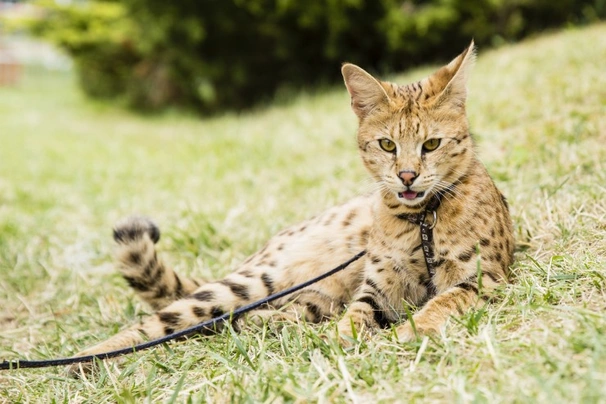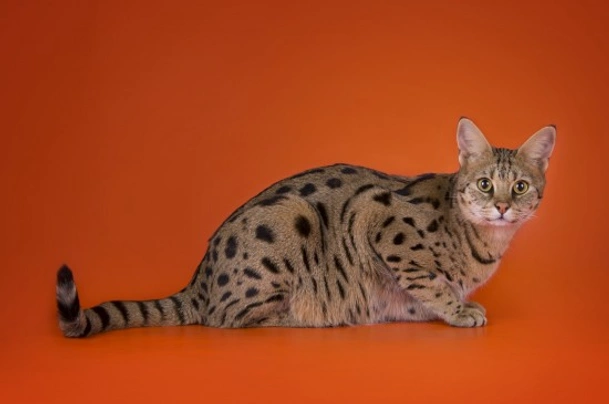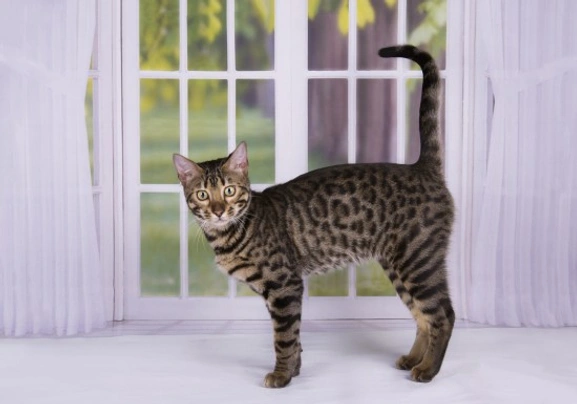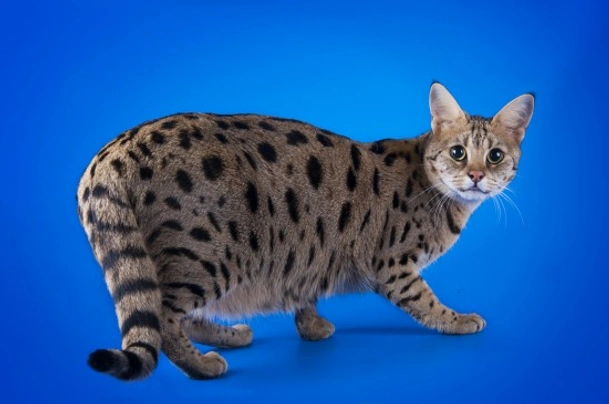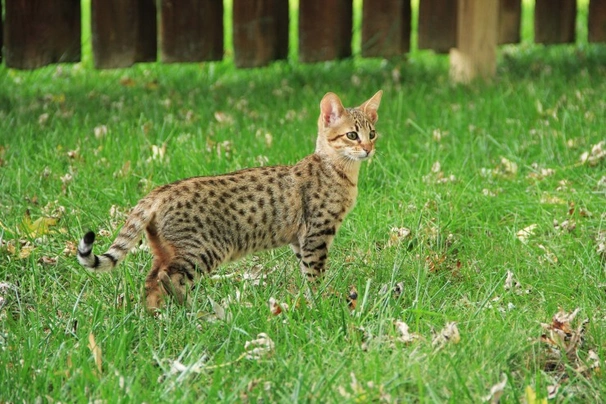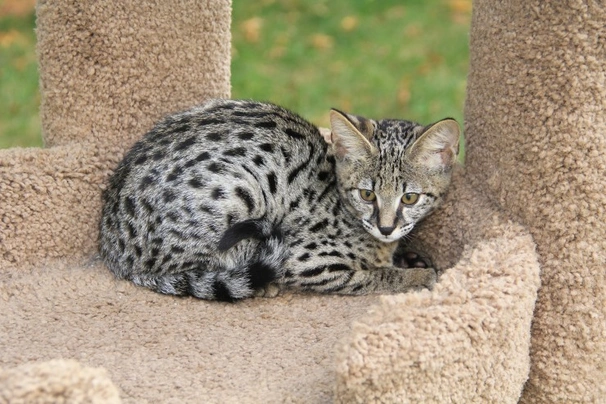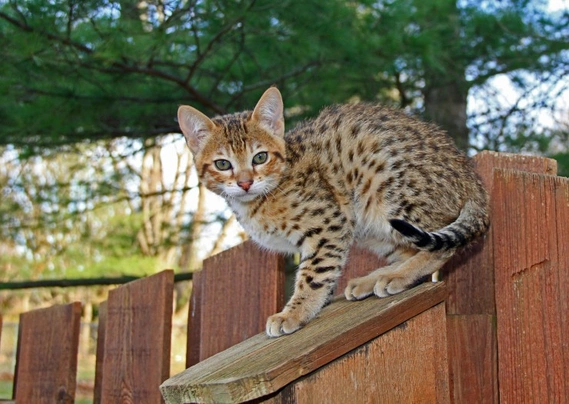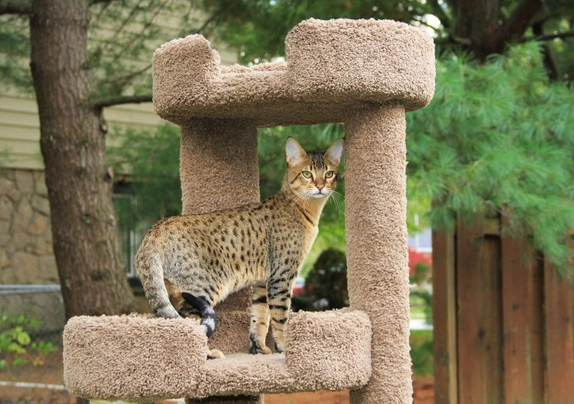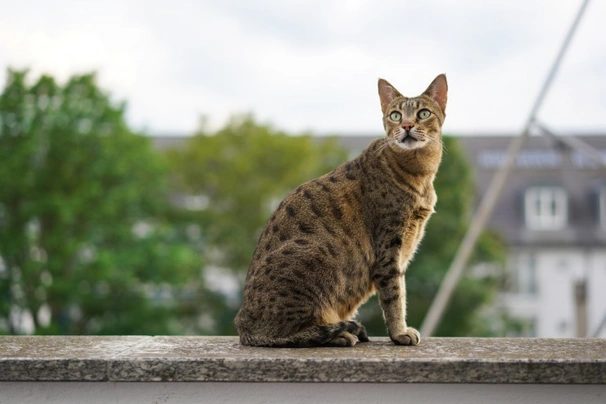Savannah
Introduction of the Savannah
The Savannah is an elegant and graceful cat with bold markings and wonderful dark spots on its fur. It closely resembles its wild cousin, the African Serval, except it is significantly smaller. Since their debut in the 1980s, Savannahs have become one of the most popular exotic cats and, consequently, have gained fans not only in the United States but also in other parts of the world, including the United Kingdom, thanks to their magnificent appearance and their affectionate and sociable nature.
History of the Savannah
The Savannah first appeared on the scene in the mid-1980s when a domestic cat was crossed with an African Serval. Their mating produced a first-generation hybrid female (F1), and it was this cat that became the first Savannah to be registered. It had inherited traits from both parent breeds and caught the attention of a breeder named Patrick Kelly, who then went on to develop the breed. He was assisted by another breeder, Joyce Sroufe, and together they drafted the first breed standard for Savannah cats with the ultimate goal of standardizing the breed.
Savannahs were recognized by TICA in 2001, but the breed achieved Championship status only in 2012. However, these elegant cats with a wild appearance have not yet been accepted by the GCCF, but the good news is that many renowned British breeders are now producing well-bred Savannahs, as their popularity grows and their numbers steadily increase.
Appearance of the Savannah
The Savannah is a cat with a truly unique and well-balanced appearance, one that stands out in a crowd. They are proud and elegant felines boasting large, straight ears similar to those of an African Serval. They also have hooded eyes that are set rather flat on the cat's face, adding to the exotic look of the Savannah. Their coats are beautifully spotted and speckled, another feature that sets them apart from other breeds.
Their heads are shaped like an equilateral triangle and are quite small compared to the rest of the cat's body. They have extremely large ears, set high and wide, deeper at the base but with rounded tips. The cats keep their ears very erect and can be well furnished with well-defined eye markings (spots on the eyes). They have medium-sized eyes, well-positioned under the cat's slightly hooded eyebrows, with the top of the eye having a boomerang shape while the bottom is more almond-shaped. The cats have tear markings between and along the eyes and nose. Savannahs can have eyes of any color and do not need to match the coat color.
Their chin tapers following the line of the cat’s triangular head. Seen in profile, a cat's nose protrudes slightly, giving the impression that the chin is a bit recessed. The muzzles are tapered without evidence of break. Viewed from the side, the cat's face is also a triangle from the eyes to the tip of the nose, which is wide at the top with the nostrils positioned low. The nose skin is slightly convex, so it wraps around the cat’s nose. Savannahs have long, slender necks, contributing to their well-balanced appearance.
The body of the Savannah is long, well-muscled, and very slender, with cats having deep, full chests and well-prominent shoulders. The bellies are slightly raised and the rears are well-rounded. The hips and thighs of the cats are long and full, quite heavy compared to the rest of the body. Their legs are longer than those of an average cat and well-muscled, with the hind legs being somewhat longer than the front legs. They have medium-sized oval feet, and their tails are moderately thick and of medium length, wider at the base before tapering slightly to a blunt tip.
Regarding their coat, the Savannah boasts an extremely striking, short, and close-fitting coat with a slightly rough texture due to the coarser guard hairs covering a much softer undercoat. The cat's spots are much softer than the guard hairs. Their colors are as follows:
- Black
- Brown (Black)
- Spotted Tabby
- Silver Spotted Tabby
- Smoked Black
Temperament of the Savannah
Like many other breeds, the Savannah loves a routine and doesn't particularly appreciate when it changes for any reason. They enjoy being fed at the same time of day and don't like it when furniture is moved around the house, which can often stress cats. That said, Savannahs are known for having wonderful personalities and are often described as being quite dog-like in many of their behaviors. They are extremely curious and love to know what is happening in their environment. They are confident, outgoing, and thrive on being around people. They also have remarkable energy, which means living with a Savannah is never boring. They form strong bonds with their owners and, although they are not lap cats, they love receiving as much attention as possible. They enjoy greeting their owners at the door when they come home, which is one of the dog-like traits that makes the Savannah so affectionate to live with.
Unlike many other breeds, the Savannah has a fascination with water and loves to play with a dripping faucet; they even play in the water when given the chance. Being so intelligent and eager to be with the people they love, Savannahs can be taught to wear a harness and take a walk on a leash, which they enjoy very much. They can be quite demanding and, since they form such strong bonds with their owners, they are better suited to families where at least one person stays at home when the others are out, so they are not left alone for too long.
They love exploring the outdoors, but cats should only be allowed to roam outside if it is safe for them to do so. The good news is that Savannahs adapt well to being kept as apartment pets, provided they receive plenty of attention and things to keep them occupied, which means investing in many high-quality interactive toys. Sharing a home with a Savannah means creating high platforms for them to perch on when they want, because they love being able to view the world from a preferred vantage point. They are quite talkative, especially during mealtimes or when they want to attract their owner's attention.
Intelligence / Trainability of the Savannah
Savannahs are known for being extremely intelligent and can be taught to do all sorts of things, including wearing a harness and going for a walk, just like their canine counterparts. They also love playing interactive games like "fetch the toy" and will happily do so for hours on end. They are extremely skilled at problem-solving, which means they quickly learn how to open cabinet doors to see what’s inside. The same applies to other doors in a house, which they soon learn to open if they can. They love water and, unlike many other breeds, enjoy bathing in ponds, so it is important to be cautious if there are fish, and ideally, a net should be placed over the pond to prevent a Savannah from catching them.
Children and other
The Savannah, with their outgoing and affectionate personality, are the perfect choice for families with children. They are quick on their feet and thus know when to distance themselves from younger children when they become too lively or noisy. However, it is important to be cautious when there are very young children around the cats, and any interaction should always be well supervised by an adult to ensure things remain calm and peaceful. That said, children should be instructed on how to behave around cats and when it is time to leave them alone.
They also get along well with dogs and other cats, especially if they have grown up together in the same household. However, caution is needed when introducing a Savannah to dogs they do not already know, in case the dog does not get along with its feline friends. They are social by nature and are known to get along with pet birds and small animals, but it is always wiser to keep an eye on any cat when they are around smaller pets, particularly when meeting for the first time, to be sure.
Health of the Savannah
The average lifespan of a Savannah is between 17 and 20 years if properly cared for and fed with a high-quality diet suitable for its age.
The Savannah is known for being a healthy breed and does not seem to suffer from the hereditary disorders that can often affect other breeds. However, the breed is still very young, which is why it is important for Savannahs to be bred responsibly to maintain their health. One condition that could affect them is:
- Pyruvate Kinase Deficiency - breeders should have the DNA of breeding cats tested
Caring for the Savannah
As with other breeds, Savannahs also need to be brushed regularly to ensure their fur and skin are kept in excellent condition. Additionally, cats should be fed high-quality food that meets all their nutritional needs throughout their life, which is especially true for kittens and senior cats.
Grooming of the Savannah
Savannahs boast having short close lying quite dense coats and as such they are low maintenance on the grooming front. A weekly brush and wipe over with a chamois leather is all it takes to keep their coats in good condition with a nice sheen on it. Like other breeds they tend to shed the most in the Spring and then again in the Autumn when more frequent brushing is usually necessary to keep on top of things.
It's also important to check a cat's ears on a regular basis and to clean them when necessary. If too much wax builds up in their ears it can lead to a painful infection which can be hard to clear up. In short prevention is often easier than cure with ear infections. Cats often suffer from ear mites which can be a real problem which is another reason why it's so important to check their ears every week or so.
Exercise of the Savannah
Savannah cats boast a lot of energy and are so intelligent that they need many things to keep them occupied, which is particularly true when they are kept as indoor pets. They love receiving as much attention as possible, which means they can sometimes be a bit demanding, but never excessively. They adore playing with puzzle toys, and being so intelligent, they are quick to solve problems. As mentioned earlier, they love being able to roam in a garden, but they should only be allowed to do so if it is safe.
Indoor cats need many things to do and places to hide when they want, keeping in mind that Savannahs love to climb as high as possible to observe what’s happening below them from a preferred vantage point. They also need many spots to curl up for a nap when they feel like it, because if there’s one thing cats are really good at, it’s napping during the day.
Feeding of the Savannah
If you obtain a Savannah kitten from a breeder, they will provide you with a feeding schedule and it is important to stick to the same routine, feeding the same kitten food to avoid stomach issues. You can change a kitten’s diet, but this should be done very gradually, always ensuring they do not develop digestive problems, and if any do occur, it is better to revert to the original diet and discuss it with the veterinarian before attempting to change it again.
Older cats are not known for being picky about food, but that does not mean they can be fed a low-quality diet. It is better to feed a mature cat several times a day, ensuring that the food is of good quality and meets all their nutritional requirements, which is particularly important as they age. It is also essential to monitor a cat’s weight, as gaining too much weight can seriously impact their overall health and well-being. Like all other breeds, Savannahs need to have constant access to fresh, clean water.
Savannah price
If you are looking to buy a Savannah, you should expect to pay from £850 to well over £2000 for a well-bred kitten. The cost to insure a 3-year-old male Savannah in northern England would be £14.96 per month for basic coverage, but a lifetime policy would cost you £27.16 per month (quote from February). When insurance companies calculate the premium for a pet, they consider various factors including where you live in the UK, the cat's age, and whether it has been neutered or spayed, among other things.
Regarding food costs, you need to purchase the best quality food, both wet and dry, ensuring it is suitable for the different life stages of a cat. This will cost you between £15 and £20 per month. Additionally, you need to consider veterinary costs if you want to share your home with a Savannah, which includes their initial vaccinations, annual boosters, the cost of neutering or spaying when the time is right, and annual health checks, all of which quickly add up to over £600 per year.
As a rough guide, the average cost to maintain and care for a Savannah would be between £40 and £60 per month, depending on the level of insurance coverage you choose for your cat, but this does not include the initial cost of purchasing a well-bred kitten.
